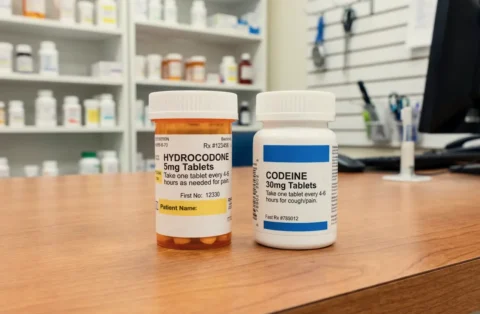What you’ll learn
We’ll walk through how Suboxone® affects your blood pressure and what that means for your health. You’ll learn why blood pressure changes happen, what to watch for if you have heart conditions, and why combining Suboxone with other medications like Zubsolv® needs extra attention.
You might be here because you’re starting Suboxone® treatment for opioid use disorder (OUD) and want to know what to expect. Or maybe you’ve already started and noticed some dizziness or fatigue that has you wondering if it’s related to your blood pressure. It’s completely valid to want to learn more.
Suboxone can affect your cardiovascular system and your central nervous system, especially if you have a history of using opioids, including prescription medications. And yes, one possible effect is a drop in blood pressure, which is influenced by buprenorphine. For most people, this isn’t dangerous, but it’s something you should know about, especially if you have existing heart conditions or take other medications.
If you’ve been feeling lightheaded, dizzy when standing, or unusually tired since starting treatment, these symptoms may be connected to buprenorphine. Buprenorphine is the active ingredient in Suboxone that helps reduce cravings and withdrawal symptoms, but it can also influence blood pressure. You’re not imagining these symptoms, and they’re not necessarily something to worry about. But they are something to understand and monitor.
At QuickMD, we help people start Suboxone treatment safely, including patients with heart conditions and those taking blood pressure medications. Our licensed providers have experience managing your medications alongside treatment without compromising your health or recovery.
In this guide, we’ll help you understand how Suboxone can affect blood pressure, especially during opioid withdrawal phases, what symptoms mean you should reach out for help, and how to discuss your heart health with your provider.
How Suboxone (buprenorphine/naloxone) affects blood pressure
Suboxone is used to treat opioid use disorder. When you take Suboxone, you’re getting two medications: buprenorphine and naloxone.
Buprenorphine helps with intense cravings and withdrawal symptoms from opioid dependence. It’s different from other opioids because it provides therapeutic benefits without causing dangerous highs. Buprenorphine interacts with your nervous system and can lead to lower blood pressure, especially early in treatment.
Your autonomic nervous system controls automatic functions, including breathing, heart rate, and blood pressure.
The naloxone aspect is a safety feature to prevent misuse of Suboxone. When Suboxone is taken as prescribed under the tongue (through a sublingual film), naloxone has minimal effect on your body. But if someone tries to inject or misuse Suboxone, naloxone activates and can trigger withdrawal symptoms. Because Naloxone is inactive when taken as prescribed, it isn’t responsible for blood pressure effects.
When buprenorphine influences your system, your blood pressure may drop below your normal range. It’s usually not dangerous, but it can make you dizzy or tired, especially when you first start Suboxone. Most patients adjust to these changes within several weeks. Individual responses vary based on your health history and other medications.
But how do you know if what you’re feeling is actually related to blood pressure changes? Your body gives you clear signals.
Common side effects of Suboxone on blood pressure
While on Suboxone, you’ll probably feel fluctuations in blood pressure before you see it on a monitor. Your body has ways of telling you when something’s not quite right.
You may notice a few key signs. The most common ones include:
- Getting dizzy when you stand up too fast
- Feeling lightheaded or like you might faint
- Being more tired than usual
- Nausea or actually throwing up
Your body is figuring out how to work with your medication, and that takes time. Most people find that these symptoms fade as they adjust after the first few days and weeks on Suboxone.
But if you’re feeling really off, or if these symptoms stick around longer than a few days, that’s when you want to check in with your QuickMD provider.
Now, what if you already have high blood pressure? That changes things a bit.
Taking Suboxone for opioid use with high blood pressure: what to know
Having high blood pressure doesn’t automatically mean you can’t take Suboxone. But it does mean you need to be more careful about monitoring things. When you already have elevated blood pressure and start Suboxone, buprenorphine’s effect on blood pressure can be more noticeable.
Your body’s used to that higher pressure. So when it drops, you may feel worse than someone who had normal blood pressure to start with.
Your QuickMD provider needs to know about any heart problems before you start Suboxone. That includes high blood pressure (even if it’s controlled with medication), any kind of heart disease, previous heart attacks or strokes, and medications you take for your heart. This information helps your provider create a treatment plan that’s both effective and safe for your specific situation.
Do Suboxone and Zubsolv lower blood pressure together?
People often wonder about Suboxone and blood pressure because they’re considering switching to or from Zubsolv, and both medications can affect your cardiovascular system.
Zubsolv is an alternative formulation of buprenorphine and naloxone, not an additional medication you take with Suboxone. Zubsolv provides equivalent buprenorphine exposure to Suboxone but in different tablet strengths. Essentially, they’re two different ways to get the same treatment. Like Suboxone, Zubsolv is known to cause a decrease in blood pressure and dizziness, especially when standing up quickly.
At QuickMD, we focus on Suboxone treatment because it’s the most effective, established, and widely studied buprenorphine formulation. Suboxone has extensive research backing its safety and effectiveness, and our providers have the most experience managing its cardiovascular effects.
If you’re concerned about blood pressure changes with Suboxone, our team can help you manage these effects safely rather than switching to less familiar formulations. The key is staying in touch with your provider and being honest about how you’re feeling.
Risk factors for blood pressure changes on Suboxone
Some people have a harder time with blood pressure changes. If you’re older, your body might need more time to get used to the medication.
If you take other medications, like blood pressure meds, some antidepressants, and other medications, these can interact with Suboxone in ways that affect your heart. People with other health problems, like diabetes or kidney problems, might find blood pressure changes more complicated to manage.
Sometimes your body has less reserve to handle changes if you’re not eating well, not drinking enough water, or not getting enough rest. This is common when you’re struggling, and it’s not about judgment, but reality.
Want to learn more about Suboxone treatment? Our Learning Center covers everything you need to know about starting and managing Suboxone therapy, from side effects to success stories.
Managing blood pressure during Suboxone treatment
During your first few weeks on Suboxone, you’ll probably get your blood pressure checked more often. This isn’t because something’s wrong, but because your provider wants to make sure you’re adjusting well to the buprenorphine.
If your blood pressure drops too much, your provider might adjust your Suboxone dose or change other medications. Sometimes it’s just a matter of timing. Taking medications at different times of day can help. But knowing when to call for help is just as important as the monitoring itself.
When to reach out for help
Some symptoms need immediate attention: feeling like you’re going to pass out, chest pain or irregular heartbeat, trouble breathing, severe headaches, or any signs of an allergic reaction. Don’t wait on these. Call your provider right away, or go to the emergency room if you need to.
For other concerns, like ongoing dizziness, unusual tiredness, or just feeling “off,” reach out to your provider within a day or two. They’d rather hear from you too soon than too late.
Talking honestly with your QuickMD provider
Your safety depends on your provider knowing the whole picture. Before starting Suboxone, share everything about all medications you’re taking (including over-the-counter stuff and supplements), your complete medical history (especially anything related to your heart), any bad reactions you’ve had to medications before, your substance use history, and mental health conditions and any medications for those.
This isn’t about giving them reasons to deny you treatment. It’s about giving them the information they need to treat you safely.
Need help starting Suboxone safely?
We make it simple to start Medication-Assisted Treatment (MAT) with Suboxone from home, with providers who understand how to manage cardiovascular considerations during recovery. You can speak with a licensed medical provider the same day and get support that takes your whole health picture into account.
We offer Medication Assisted Treatment (MAT) in most states.
All visits for addiction treatment are $99. Your initial visit includes one follow-up visit at no extra cost as long as it’s completed within 14 days of your first visit. Medication costs are not included and may vary based on the pharmacy you choose and your prescription drug coverage.
Your first visit is called the induction visit. During this visit, your provider will prescribe a 7-day supply of buprenorphine-naloxone (Suboxone) to monitor your tolerance and adjust the dosage as needed. After induction, you’ll continue with monthly follow-up visits as part of your ongoing treatment plan.
Frequently asked questions about Suboxone lowering blood pressure
How long do blood pressure changes last when starting Suboxone?
For most people, blood pressure levels out within 2-4 weeks of starting treatment. But everyone’s different. Some people adjust faster, others take a bit longer. Your provider will keep an eye on you during this adjustment period to make sure you’re safe.
Will Suboxone cause high blood pressure?
No, Suboxone does not typically cause high blood pressure. In fact, the opposite is more common. If you’re experiencing high blood pressure while on Suboxone, it’s more likely due to other factors like opioid withdrawal symptoms if you recently stopped other opioids, stress, other medications you’re taking, or any other underlying health conditions.
Some people mistakenly think Suboxone caused their high blood pressure because they started treatment during withdrawal, when blood pressure naturally spikes. Suboxone is often prescribed after the peak withdrawal phase, where blood pressure may be elevated, helping to stabilize the body as it adjusts.
Is buprenorphine bad for your heart?
Buprenorphine (one of the main ingredients in Suboxone) is generally considered safe for your heart when used as prescribed and with proper medical supervision. In fact, research shows that buprenorphine has a more favorable cardiac safety profile in the long term compared to other opioid medications.
Clinical case studies have documented situations where patients who developed serious heart rhythm problems with methadone were successfully switched to buprenorphine as a safer alternative. In these cases, patients maintained normal heart function while continuing their addiction treatment.




